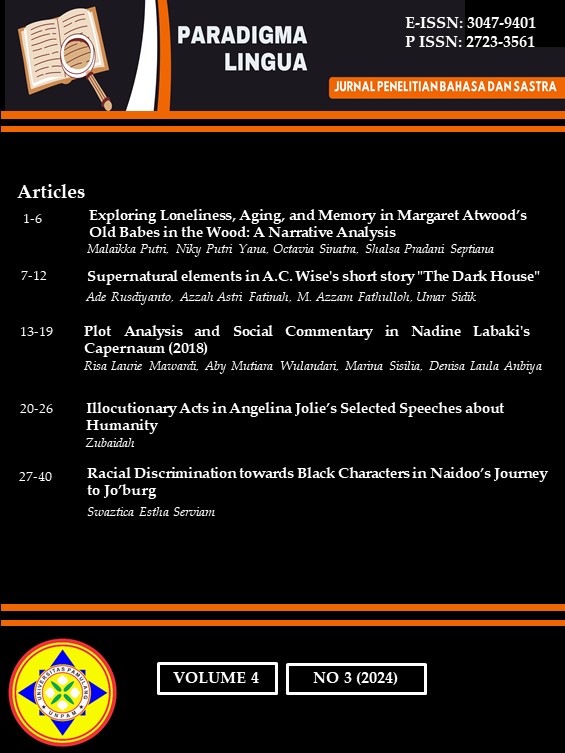Racial Discrimination towards Black Characters in Naidoo’s Journey to Jo’burg
Keywords:
discrimination, individual, institutional, structural, black charactersAbstract
This study aims at analyzing the issue of racial discrimination in the children’s book focused on the representation of racial discrimination. The object of this study is Journey To Jo’burg by Beverley Naidoo (2016). To analyze this study, the writer used the types of racial discrimination theory from Fred L Pincus (1994). This study applied a qualitative research method. The writer focuses on black characters who become a victim of racial discrimination. There are three things that can be concluded. The first, there are three types of discrimination that happen in the story of the book, there are individual discrimination, institutional discrimination, and structural discrimination. The second, the effect of discrimination are the social class differences. The third, racial discrimination occurs when there is a desire to control all things for personal and group benefits that apply discrimination against other person or groups who are harmed.
References
Adams, M. (2000). Discrimination Comes in Many Forms: Individual, Institutional, and Structural by Fred L. Pincus. Readings for Diversity and Social Justice, 1-2.
Albloly, A. M., & Ali, A. M. (2015, September). DEVELOPING THE STUDENTS’ LITERARY APPRECIATION OF NOVELS VIA FACEBOOK. International Journal of Recent Scientific Research, 6(9), 6011-6015.
Ananthi Al Ramiah, M. H. (2010). The Social Psychology of Discrimination: Theory, Measurement and Consequences. 84-86.
Clark, N. L., & Worger, W. H. (2013). South Africa The Rise and Fall of Apartheid . New York: Routledge.
Clarke, S. (2003). Social Theory, Psychoanalysis and Racism. London: Palgrave.
Creswell, J. W. (2014). Qualitative, Quantitative, and Mixed Methods Approaches. United State of America: SAGE Publications, Inc.
Draaisma, G. (2019). Imagining the Real: Apartheid in Beverley Naidoo’s Journey to Jo’Burg. Utrecht : Utrecht University.
Eke, P. O., & Obika, A. N. (2018). Apartheid Laws and the Oppressed in South Africa: An Example of Athol Fugard's Sizwe Bansi is Dead. Research and Analysis Journal, 05-11.
Fanani, R. A. (2013). Racial Discrimination Suffered Black People as Portrayed in Flannery O’Connor’s Short Story. Malang: Maulana Malik Ibrahim State Islamic University of Malang.
Henkel, K. E., Dovidio, J. F., & Gaertner, S. L. (2006). Institutional Discrimination, Individual Racism, and Hurricane Katrina. Analyses of Social Issues and Public Policy. Analysis of Social Issues and Public Policy, 6, 99-124. doi:10.1111/j.1530-2415.2006.00106.x
Hutami, A. H. (2018). An Analysis of Racial Discrimination Experienced by Langston Hughes as Reflected in his Poems I, Too, Merry-Go-Round, and Ku Klux. Yogyakarta: Sanata Dharma University.
Idris, M. M. (September 2017). An Analysis of The Racial Discrimination Suffered By Edgar Allan in John Neufeld's Edgar Allan. TELL Journal, 18-29.
Khasnawati, K. (2017). Social Discrimination Against Minority Reflected in Okky Madasari's Novel "The Outcast" (2014): A Marxist Analysis. Surakarta: Muhammadiyah University of Surakarta.
Krantz, D. L. (2008). Politics & Photography in Apartheid South Africa. History of Photography, 291-292.
Lynch-Brown, C., & Tomlinson, C. M. (1999). Essentials of Children's Literature. United States: A Viacom Company.
M Blank, R., Dabady, M., & Constance, F. (2004). Measuring Racial Discrimination. Washington, D.C. : The National Academies Press.
Marcus, G., & Sollors, W. (2009). A New Literary History of America. United States: Harvard University Press.
Marpaung, R. R. (2010). An Analysis of Racial Issues in Some Langston Hughes' Poems . Medan: University of North Sumatera.
McLeod, S. A. (2008). Prejudice and Discrimination. Retrieved from www.simplypsychology.org: https://www.simplypsychology.org/prejudice.html
Merriam-Webster's . (2006). Merriam-Webster's Dictionary AND Thesaurus. Springfield: Merriam Webster-Inc.
Naidoo, B. (2016). Journey To Jo'burg. United Kingdom: HarperCollins Children's Book.
Pincus, F. L. (Nov/Dec 1996). Discrimination Comes in Many Forms: Individual, Institutional, and Structural. American Behavioral Scientist, 186-194.
Pincus, F. L., & Ehrlich, H. J. (2018). Race and Ethnic Conflict Contending Views on Prejudice, Discrimination, and Ethnoviolence. New York: Routledge.
Rahmawati. (2017). An Analysis Of Characteristics And Psychological Conflicts Of The Main Characters In Sidney Sheldon’s Novel “Tell Me Your Dreams”. Mataram: University of Mataram.
Shelly P. Harrell, P., & Gesenia Sloan-Pena, M. (2006). RACISM AND DISCRIMINATION. In Y. Jackson (Ed.), Encyclopedia of Multicultural Psychology, 1-3.
Smadley, A. (2020, June 25). Encyclopædia Britannica, inc. Retrieved Juli 14, 2020, from Encyclopædia Britannica: https://www.britannica.com/topic/racism
Yuniarsih, E. (2018). Racial Discrimination Against Black People In The Blind Side Movie. Semarang: Diponegoro University.
Downloads
Published
How to Cite
Issue
Section
License
Authors who publish with this journal agree to the following terms:
- Authors retain copyright and grant the journal right of first publication with the work simultaneously licensed under a Creative Commons Attribution License that allows others to share the work with an acknowledgement of the work's authorship and initial publication in this journal.
- Authors are able to enter into separate, additional contractual arrangements for the non-exclusive distribution of the journal's published version of the work (e.g., post it to an institutional repository or publish it in a book), with an acknowledgement of its initial publication in this journal.
- Authors are permitted and encouraged to post their work online (e.g., in institutional repositories or on their website) prior to and during the submission process, as it can lead to productive exchanges, as well as earlier and greater citation of published work (See The Effect of Open Access).
Paradigma Lingua have CC-BY-SA or an equivalent license as the optimal license for the publication, distribution, use, and reuse of scholarly work.
In developing strategy and setting priorities, Paradigma Lingua recognize that free access is better than priced access, libre access is better than free access, and libre under CC-BY-SA or the equivalent is better than libre under more restrictive open licenses. We should achieve what we can when we can. We should not delay achieving free in order to achieve libre, and we should not stop with free when we can achieve libre.


